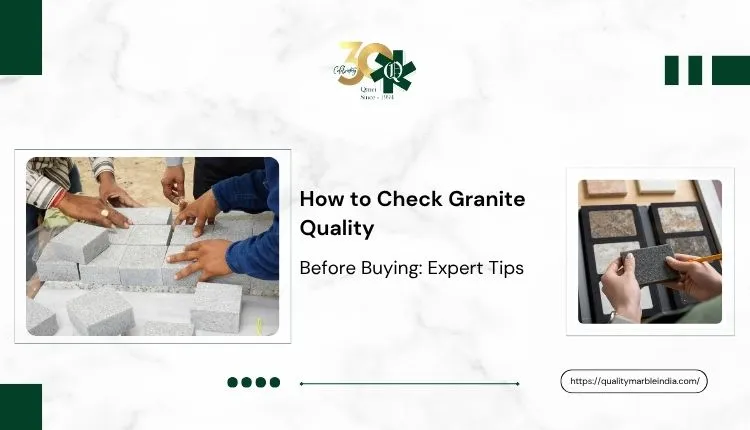When investing in granite for your home or commercial space, ensuring top-notch quality is crucial. But how do you determine if the granite you’re purchasing is worth the investment? In this guide, we’ll walk you through expert tips on how to check the quality of granite so you can make an informed choice.
Why Granite Quality Matters
Granite is a long-term investment, whether you’re using it for countertops, flooring, or decorative features. Poor-quality granite can lead to cracks, stains, and durability issues over time. Conducting a thorough granite quality check before purchasing will save you time, money, and potential disappointment.
1. Visual Inspection: The First Quality Test
The easiest way to test granite quality is through a keen visual inspection. Here’s what to look for:
- Uniformity in Color and Texture – High-quality granite has consistent color and grain distribution.
- Surface Finish – Run your hands over the surface; premium granite should have a smooth, polished finish without rough patches.
- Natural Defects – Look out for cracks, dents, or uneven patterns that could indicate weaker stone.
2. The Water Absorption Test
A simple way to check granite quality is by testing its porosity.
- Pour a few drops of water on the granite surface.
- If the water is quickly absorbed, the granite has high porosity and may stain easily.
- High-quality granite should take longer to absorb water, ensuring better stain resistance.
3. The Scratch Test: Checking Hardness
Granite is known for its toughness, but not all granite is created equal.
- Use a steel knife or a sharp object to lightly scratch the surface.
- If scratches appear easily, the granite may be of lower quality.
- High-quality granite should resist minor scratches, ensuring longevity.
4. The Acidity Test: Checking Chemical Resistance
Granite is resistant to acids, which makes it ideal for kitchen use.
- Apply lemon juice or vinegar to a small area.
- If the surface shows discoloration or reacts, it indicates poor-quality granite.
- Top-grade granite should remain unaffected by mild acidic substances.
5. Thickness and Weight Matter
The thickness of granite slabs plays a crucial role in durability. Standard quality granite should be at least 18mm thick.
- A thin slab increases the risk of breakage.
- Check the weight – authentic granite is dense and heavier compared to artificial alternatives.
6. Sound Test: The Ring of Quality
One of the easiest ways to test granite quality is by performing a sound test:
- Tap the granite surface with a metal object.
- High-quality granite produces a deep, ringing sound.
- If the sound is dull, it may indicate internal fractures or poor-quality stone.
7. The Granite Buying Guide: Key Takeaways
Before making your final purchase, follow these steps to ensure you get the best quality granite:
- Ask for a Sample – Compare different samples to evaluate color, texture, and polish.
- Check Certifications – Trusted suppliers should provide authenticity certificates.
- Buy from Reputed Dealers – Avoid low-quality imports by choosing reliable suppliers like Quality Marble India.
Make an Informed Choice with Quality Marble India
Buying granite is a long-term investment, so don’t settle for less. By following these expert tips on how to check quality of granite, you can ensure you get the best value for your money.
Looking for premium-quality granite? Quality Marble India offers a diverse range of high-quality granite with expert guidance. Contact us today to find the perfect granite for your project!









